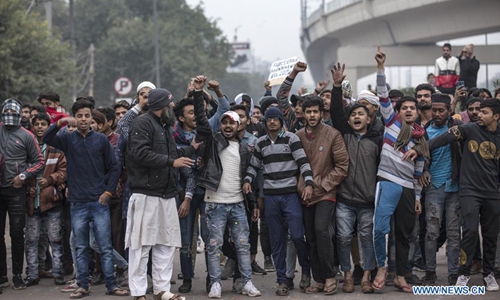HOME >> WORLD
Death toll rises to 10 in violent protests over citizenship law in India's Uttar Pradesh
Source:Xinhua Published: 2019/12/21 18:08:10

Protesters shout slogans during a protest in New Delhi, India, Dec. 17, 2019. Fresh violence was reported from parts of Delhi on Tuesday against the new Citizenship Amendment Act (CAA), which was passed by the country's Parliament last week, TV media reports said. (Xinhua/Javed Dar)
The death toll during the protests against the controversial new citizenship law has risen to 10 in the northern Indian state of Uttar Pradesh, police said Saturday.
The dead include an 8-year-old boy who was trampled in the stampede after police resorted to baton charging in Dharara locality of Varanasi district.
According to Uttar Pradesh Police Chief O P Singh, nine people were killed on Friday and none of the deaths were caused by police firing.
"Nine deaths have taken place and police have not fired a single shot," Singh told a local television channel. "If any firing happened, it was from the protesters' side. Let the post-mortem be carried out, everything will get clear."
Violent protests Friday broke out in the several parts of the state against the citizenship bill despite prohibitory orders from the government.
Locals said clashes broke out when the police tried to stop people from taking out protest rallies against the bill. Police fired tear smoke shells and resorted to baton charging the protesters, who responded by throwing stones.
Authorities had already suspended mobile internet services at around a dozen districts in the state.
Uttar Pradesh Chief Minister Yogi Adityanath has warned that his government will take revenge on those involved in damaging public assets by auctioning their properties to compensate for the loss.
One person who was killed on Thursday in Lucknow, the capital city of Uttar Pradesh, with two people killed at Mangaluru in the southern state of Karnataka. Four people being killed in the northeastern state of Assam last week.
Protests erupted across India and inside universities against the new citizenship law last week after Indian parliament passed it.
The law aims at granting citizenship to illegal immigrants belonging to six religions -- Hinduism, Sikhism, Buddhism, Jainism, Parsi and Christianity -- from Bangladesh, Afghanistan and Pakistan. However, it has kept out Muslim immigrants from applying for citizenship.
Opposition parties and civil society members in India criticize the law as contrary to secular principles enshrined in India's constitution as it excludes Muslims.
Political parties, civil society activists and individuals have filed 60 petitions in India's top court to challenge the new law.
Posted in: CENTRAL & SOUTH ASIA